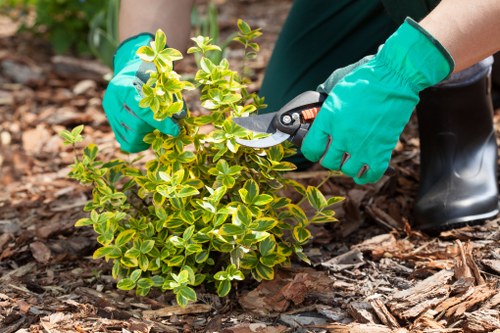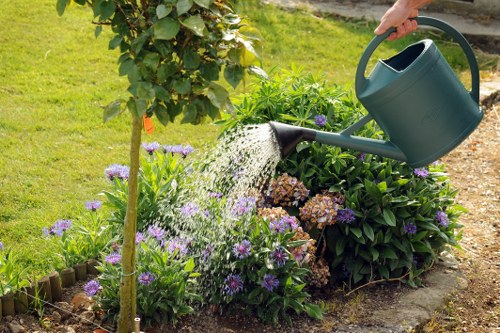Oil Stain Removal for Driveways in Neasden

Oil stains on driveways are not only unsightly but can also lead to long-term damage if not addressed promptly. In Neasden, where many households rely on their driveways for daily use, maintaining a clean surface is essential. This article explores effective methods for removing oil stains from driveways in Neasden, ensuring your property remains pristine.
Understanding the source of oil stains is the first step in effective removal. Common culprits include vehicle leaks, spills from oil containers, and accidental drops during maintenance tasks. Identifying the cause can help in selecting the most appropriate cleaning method.
Neglecting oil stains can result in concrete deterioration, making removal more challenging over time. Additionally, oil spills can be hazardous to the environment, seeping into the ground and contaminating surrounding areas. Therefore, prompt and efficient removal is crucial.
Causes of Oil Stains on Driveways

Oil stains on driveways primarily originate from:
- Vehicle Leaks: Engine oil, transmission fluid, and other automotive fluids can leak onto the driveway.
- Spills: Accidental spills from oil containers during refueling or maintenance tasks.
- Garage Activities: DIY projects and repairs can sometimes result in spills.
- Environmental Factors: Heavy rainfall can exacerbate existing stains by spreading the oil further.
Recognizing these sources helps in taking preventive measures to minimize future stains.
Regular vehicle maintenance and prompt attention to leaks can significantly reduce the occurrence of oil stains.
Importance of Removing Oil Stains

Removing oil stains is essential for several reasons:
- Preventing Concrete Damage: Oil can penetrate concrete, leading to weakening and eventual cracking.
- Enhancing Curb Appeal: A clean driveway contributes to the overall aesthetic of your property.
- Environmental Protection: Prevents oil from seeping into the ground and contaminating soil and water sources.
- Safety: Oil spills can create slippery surfaces, posing hazards to pedestrians and vehicles.
Addressing oil stains promptly ensures your driveway remains functional and attractive.
Moreover, maintaining a clean driveway can increase the value of your property.
Effective Methods for Oil Stain Removal

There are various methods to remove oil stains from driveways, ranging from DIY solutions to professional services. Below are the most effective techniques:
DIY Methods
For homeowners who prefer tackling stains themselves, the following DIY methods can be effective:
1. Absorbent Materials
- Baking Soda: Sprinkle baking soda over the stain to absorb the oil. Let it sit for several hours before sweeping it away.
- Cat Litter: Similar to baking soda, cat litter can absorb oil effectively.
2. Detergent and Hot Water
Mix a strong detergent with hot water and scrub the stained area using a stiff brush. Rinse thoroughly with water.
3. Pressure Washing
A pressure washer can remove oil stains by blasting them away with high-pressure water. Ensure you use the appropriate pressure setting to avoid damaging the concrete.
While DIY methods can be effective for small or fresh stains, more stubborn or older stains may require professional intervention.
Professional Services
For severe or persistent oil stains, hiring a professional service in Neasden can be the most effective solution. Professional cleaners use specialized equipment and chemicals designed to break down and remove oil stains without damaging the driveway.
Benefits of professional services include:
- Expertise: Trained professionals understand the best techniques for different types of stains.
- Time-Efficient: Professionals can remove stains quickly, saving you time and effort.
- Long-Lasting Results: Professional cleaning often results in longer-lasting cleanliness compared to DIY methods.
Investing in professional services ensures your driveway is thoroughly cleaned and maintained.
Best Practices for Maintaining a Clean Driveway

Maintaining a clean driveway involves regular upkeep and preventive measures to avoid future stains:
- Regular Cleaning: Sweep your driveway regularly to remove debris and prevent stains from setting in.
- Seal Coating: Applying a sealant can protect your driveway from oil penetration and make future cleaning easier.
- Immediate Spill Cleanup: Address spills as soon as they occur to prevent oil from soaking into the concrete.
- Use Drainage Solutions: Ensure proper drainage to prevent oil from pooling and spreading.
- Proper Vehicle Maintenance: Regularly check for leaks and address them promptly.
Implementing these practices can significantly extend the lifespan of your driveway and keep it looking new.
Additionally, educating household members about the importance of preventing spills can help maintain cleanliness.
Local Areas Near Neasden for Oil Stain Removal Services
Neasden is surrounded by several neighborhoods that also benefit from oil stain removal services. Here are the closest areas:
- Willesden: Just northwest of Neasden, Willesden offers residential and commercial areas in need of driveway maintenance.
- Kenton: Located southeast, Kenton has many single-family homes with driveways prone to oil stains.
- West Kilburn: To the south, West Kilburn features a mix of detached and semi-detached houses with driveways.
- Mapesbury: Northeast of Neasden, Mapesbury residents seek effective cleaning solutions for their driveways.
- Brent Cross: Known for its shopping center, Brent Cross also has residential areas needing driveway care.
- Hendon: Northwest, Hendon has both urban and suburban driveways requiring maintenance.
- Cricklewood: South of Neasden, Cricklewood's diverse housing stock benefits from professional cleaning services.
- Kilburn: To the east, Kilburn's busy streets and driveways often face oil stain challenges.
- Stonebridge: West of Neasden, Stonebridge's commercial and residential driveways require regular upkeep.
- North Wembley: Adjacent to Neasden, North Wembley is another area where driveway maintenance is essential.
- Willesden Green: Close to Neasden, Willesden Green residents prioritize clean and well-maintained driveways.
- Brondesbury: Southeast, Brondesbury's homes with driveways benefit from effective oil stain removal solutions.
- Dollis Hill: Northwest, Dollis Hill sees a mix of residential driveways needing maintenance.
- Queensbury: South, Queensbury's driveways are often targets for oil stains from nearby roads.
- Tokyngton: A bit farther southeast, Tokyngton residents still rely on Neasden's services for driveway care.
Each of these areas benefits from accessible and reliable oil stain removal services available in Neasden.
Conclusion
Maintaining a clean driveway in Neasden is essential for both aesthetic and structural reasons. Whether you choose DIY methods or opt for professional services, addressing oil stains promptly will ensure your driveway remains in excellent condition. Additionally, implementing best practices and preventive measures can significantly reduce the occurrence of future stains, keeping your property looking its best.
Frequently Asked Questions
1. How quickly should I address oil stains on my driveway?
It's best to address oil stains as soon as they occur to prevent them from setting and causing long-term damage. Prompt action makes removal easier and more effective.
2. Are professional oil stain removal services more effective than DIY methods?
Yes, professional services often use specialized equipment and chemicals that can remove stubborn or older stains more effectively than DIY methods.
3. Can oil stains on my driveway harm the environment?
Yes, oil can seep into the ground and contaminate soil and water sources, posing environmental hazards. It's important to clean up spills promptly to prevent this.
4. How can I prevent future oil stains on my driveway?
Regular vehicle maintenance, immediate spill cleanup, and applying a sealant to your driveway are effective ways to prevent future oil stains.
5. How often should I seal my driveway to protect against oil stains?
It's recommended to seal your driveway every two to three years, depending on the climate and level of use, to provide ongoing protection against oil and other stains.
Frequently Asked Questions
Our Neasden garden services utilize eco-friendly weed control, ride-on mowers, and precision hedge trimmers to keep your garden pristine. With over a decade of local experience, our team ensures sustainable and efficient maintenance tailored to your garden’s unique needs. Get in touch with our Neasden gardeners for a personalized maintenance plan.
Yes, our gardeners in Neasden are accredited by the British Association of Landscape Industries (BALI). This affiliation ensures we adhere to the highest standards in garden maintenance and landscaping. Trust our certified team to deliver top-notch Neasden garden services every time.
Absolutely. Our Neasden gardening team holds full public liability insurance and is certified in pesticide handling. This guarantees that all our services are safe, reliable, and compliant with industry regulations. Choose our insured Neasden gardeners for peace of mind and professional results.
Our gardeners in Neasden have over 10 years of experience maintaining local estates and private gardens. Their expertise covers everything from turfing and pruning to landscaping and garden clearance. Trust our seasoned team to keep your Neasden garden looking its best all year round.
Neasden garden services include lawn mowing, hedge trimming, weed control, pruning, turfing, and garden clearance. We also offer seasonal services like leaf clearance in autumn and lawn preparation in spring. Contact our Neasden gardeners to customize a maintenance plan that suits your garden’s needs.
Finding trusted gardeners in Neasden is easy with our locally renowned garden services. Our team is known for reliability, professionalism, and exceptional results. Reach out to us today to connect with the best garden maintenance experts in Neasden and enhance your outdoor space.
Yes, our garden clearance services in Neasden are both affordable and highly reliable. We offer competitive pricing without compromising on quality, ensuring your garden is cleared efficiently and safely. Get a free quote from our Neasden team and experience exceptional garden clearance services.
Our Neasden gardeners use eco-friendly weed control methods such as organic herbicides and manual weeding techniques. These sustainable practices protect your garden’s health and the surrounding environment. Choose our environmentally conscious Neasden garden services for a greener, healthier garden.
Absolutely. Our Neasden landscaping services are equipped to handle both large estates and private gardens with precision and care. From intricate garden designs to comprehensive maintenance, our experienced team ensures your landscape meets your vision. Contact our Neasden landscapers for bespoke landscaping solutions.
In Neasden, we offer a range of seasonal gardening services including spring lawn preparation, summer garden maintenance, autumn leaf clearance, and winter garden protection. Our team’s seasonal expertise ensures your garden remains vibrant and healthy throughout the year. Schedule seasonal services with our Neasden gardeners today.
Safety is a top priority for our Neasden garden services. Our team is professionally trained, fully insured, and follows all safety protocols during garden maintenance and landscaping projects. We use secure equipment and environmentally safe products to protect both your garden and our workers. Trust our Neasden gardeners for safe and dependable service.
Our Neasden gardening team stands out due to our extensive local experience, professional accreditations, and commitment to eco-friendly practices. We prioritize customer satisfaction with personalized service and reliable maintenance schedules. Choose our trusted and affordable Neasden garden services to keep your outdoor space beautiful and well-maintained.







